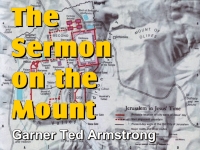The Sermon on the Mount

Since society is founded on lies, what are our chances for world peace in your time and mine? Since society is founded not on ideals, but on the nature of man, what are our chances for world peace in the next few years? What are the chances of escaping nuclear annihilation as a result of the present situation in the world with the capability of destroying more 50 worlds like ours with a society that is founded basically upon lies? How do you define human nature? Well the fundamental tendencies and feelings of mankind.
Transcript of this World Tomorrow Radio Broadcast coming.
Please Note: The FREE literature offered on this program are no longer available through the Address and Phone Number given, please visit www.hwalibrary.com for all FREE literature offered on this program.
Broadcast Date: 1974






